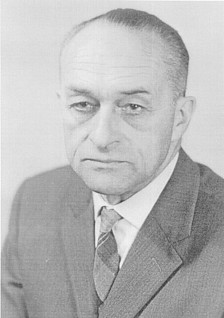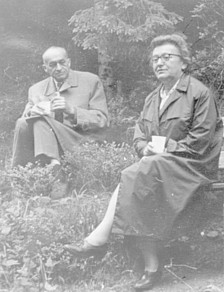Developments during the period 1950-1969
The discipline of extension did not yet have a theoretical foundation; however, at the same time there were urgent problems to be solved. Rheinwald therefore started with implementing the US American experiences, as far as possible, combined with comprehensive review activities for the OECD (Organisation for Economic Cooperation and Development). Most (west) European countries went to great lengths to establish an agricultural extension service after the war. With his relevant German extension experience Rheinwald together with Preuschen wrote the textbook “Agricultural Extension”, Bonn, 1956.
Rheinwald was early to highlight the inseparable interdependence between the farm and the household of family-held agricultural enterprises. This gave him strong impetus to develop the study course “Household Economics” at Hohenheim.
Due to an increased focus on the further development of farm business planning methods from the German agricultural economics institutes, the institute could dedicate itself more to the elementary methodological questions of extension. This research included the history of agricultural extension (“Extension Circles”), the organisation of extension (Denmark, The Netherlands and England), extension methods (pig feeding, demonstration farms), farmer decision behaviour (machinery purchasing, credit use, book-keeping), the influence of management qualification on profitability, intellectual investment in Agriculture and finally, the postdoctoral research of Erna Hruschka on the theme of psychological fundamentals of the extension process (1969).
Prof. Dr. Hans Rheinwald
Institute of Agricultural Counseling
Born on 17.01.1903 in Stuttgart, Hans Rheinwald completed his doctorate with Ms Prof. v. Wrangell at the institute for plant nutrition. With his work at the Prussian Agricultural Trial and Research Institute in Landsberg/Warthe, in the area of Agricultural Chemistry, Rheinwald had early ambitions to make scientific research rapidly available to farmers. He built up a fertilizer consultancy and was managing director of one of the earliest farmer-organised extension groups.
He passed away on 23.10.1968 shortly after retirement. As director of the Institute for Agricultural Extension (applied for by the senate in 1947 and founded on 1.10.1950) at the Agricultural University Hohenheim, the first institute of this kind in Germany, he started with clarifying the essence, objective and function of extension and scientifically elaborated the methodology of extension, before he advanced on to the social-psychological questions of extension from the 1960’s. This was significantly intensified by the collaboration with Erna Hruschka.


